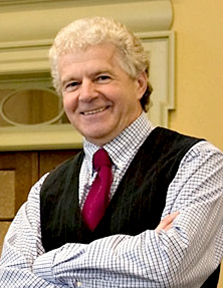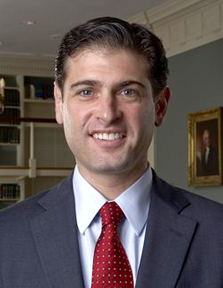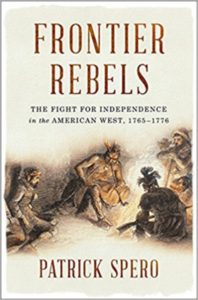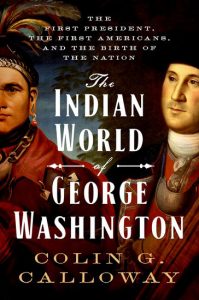The Journal of the American Revolution today announced The Indian World of George Washington: The First President, the First Americans, and the Birth of the Nation by Colin G. Calloway (Oxford University Press) as winner of the 2018 Journal of the American Revolution Book of the Year Award.
Honorable mention was awarded to Frontier Rebels: The Fight for Independence in the American West, 1765–1776 by Patrick Spero (W.W. Norton & Company).
The award—an international award dedicated to nonfiction books specifically on the Revolutionary and Founding eras—has been given annually since 2014 to the work that best reflects the mission of the Journal: to deliver engaging, creative, and intelligent content that makes American Revolution history accessible to a broad audience. The award honors original research combined with a well-crafted narrative that appeals to scholars and non-academic readers alike. Past winners include The Martyr and the Traitor by Virginia DeJohn Anderson, Brothers at Arms by Larrie D. Ferreiro, and Independence Lost by Kathleen DuVal. The award is judged by a panel of both professional and public historians.

This year’s winner caught our attention because of its focus on an aspect of the Revolutionary era that receives far too little attention and yet had enormous implications during the decades following the war. The Indian World of George Washington by Colin G. Calloway, John Kimball, Jr. 1943 Professor of History and Professor of Native American Studies at Dartmouth University, integrates the author’s expertise in colonial Native American studies with ever-popular biographical information about George Washington, resulting in a highly approachable treatment of complex topics that shaped the westward expansion of the United States. Here is an extract from our review of the book:
By the time of his presidency, Washington’s views of Indians had not changed significantly, nor had his interest in securing and exploiting western lands waned. But his role had changed, and he more clearly identified the young United States’ future with western expansion. The dilemma was how to make it an orderly process rather than chaotic. For all intents and purposes, the Washington administration’s policies vis-à-vis the frontier mirrored the British policies of restraint that Washington had railed against earlier. He needed to restrain settlers from advancing on the frontier in order to maintain peace with local tribes, strengthen the central government at the expense of state or local government to bring order and consistency to the process, and prevent outside forces, such as the British or Spanish, from advancing their own interests on the frontier. To that end, he advanced a policy of peaceful acquisition of Indian territory through purchase while providing the “benefits” of “civilized” life to the Native Americans. The latter meant turning them away from hunting on communal lands to adopting American concepts of private property and agriculture. Calloway summarizes the transformational, and destructive, impact this had on the Native American way of life. . . . The Indian World of George Washington . . . ends up being much more than a biography; Washington’s life serves as a framework for organizing a bigger story. Calloway tackles culture, politics, governance, military operations, and diplomacy in all their complexity. He succeeds in his goal of demonstrating the many ways in which Indian history is an important part of the American story during the country’s early years. Anyone seeking a better understanding of the American frontier in the latter half of the eighteenth century would do well to start here.

Honorable mention goes to another book that deals with matters on the colonial frontier, this time more local and specific.  Frontier Rebels: The Fight for Independence in the American West, 1765–1776 by Patrick Spero, Librarian and Director of the American Philosophical Society Library in Philadelphia, details a backcountry rebellion that occurred in 1765, a microcosm of the legal challenges that British colonial governments would face throughout the coming decade that led to full-blown war. As described in our review,
Frontier Rebels: The Fight for Independence in the American West, 1765–1776 by Patrick Spero, Librarian and Director of the American Philosophical Society Library in Philadelphia, details a backcountry rebellion that occurred in 1765, a microcosm of the legal challenges that British colonial governments would face throughout the coming decade that led to full-blown war. As described in our review,
Thomas Gage [authorized] a peace mission and an accompanying pack train of diplomatic gifts into the Ohio Valley. The operation was headed by George Croghan, deputy superintendent of Indian affairs, and Robert Callender, a Pennsylvania trader, who eventually put together one of the largest trade caravans in frontier history. To do so, the duo far exceeded Gage’s orders and, by hatching a murky scheme complete with straw men and shell companies, stood to amass personal fortunes. . . . Not surprisingly, Callender’s pack train was viewed with suspicion by western settlers, who were outraged that the Indian trade was being resumed prior to the return of captives who had been seized by the tribes. Ultimately, the locals took matters into their own hands. In March of 1765, frontier vigilantes who would come to be known as the “Black Boys” halted the pack train and destroyed its cargo; the loss was estimated to be as much as £30,000. The Black Boys then organized their own inspection system across the backcountry. . . . Local British commanders endeavored to restore order, making arrests and seizing arms. “The power to arrest civilians,” explains Spero, “without going through the usual civil legal channels, however, was a new assertion of imperial might, one taken in the moment without much thought.” Ultimately the confrontation would spiral out of control, and the King’s troops would face a brief shooting war, albeit largely bloodless, a full decade before the outbreak of the Revolution. . . . Frontier Rebels is an engaging look at a neglected but important aspect of the coming of the Revolution, as well as a tale full of rough frontiersmen, Native American statesmen, shady merchants, and indecisive public officials. Although eastern opposition to Parliamentary revenue acts constituted the immediate cause of the Revolution, Spero explains that westerners were no less outraged by the violation of “long-held and much-loved British liberties involving the protection of private property, illegal searches and seizures, and the proper role of the military in civilian communities.”
Congratulations to both of these gifted writers and historians, from all of the readers of the Journal of the American Revolution worldwide.
For more information about the Journal of the American Revolution Book of the Year Award, please visit https://allthingsliberty.com/bookawards/.










One thought on “2018 Journal of the American Revolution Book of the Year Award Announced”
Great choice! Calloway’s book had the greatest impact on my thinking of any book I read this year and it was a good year for works about the period. It really belongs near the top of anyone’s reading list.